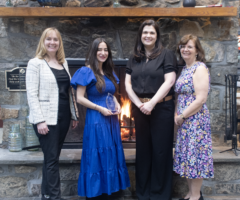 Each school year brings a sense of hope and change. And many of us want to achieve a quality home-school partnership. What’s best? Do we push more—ask more questions, of more people, more often? Do we pull back—give our children and the adults caring for them space to work things out? From my successes and failures as a parent and a career educator, I have found that it is not how much we communicate surrounding education but what attitude we bring to the communications. Curiosity is the key.
Each school year brings a sense of hope and change. And many of us want to achieve a quality home-school partnership. What’s best? Do we push more—ask more questions, of more people, more often? Do we pull back—give our children and the adults caring for them space to work things out? From my successes and failures as a parent and a career educator, I have found that it is not how much we communicate surrounding education but what attitude we bring to the communications. Curiosity is the key.
At the onset of the school year, many feel disappointed with their child’s class placement. Often we feel a particular student or two will disrupt our kid’s class or another one or two would make the class just right. This can make us anxious, at go. But do we really want to know or can we actually understand placement decisions, and compromises, any more than we can understand how any organization makes its decisions?
Educators have to balance academic levels, learning and teaching styles, social-emotional needs, and out-of-classroom demands, and they take this pressure and power seriously; they face the consequences of their choices. Further, even when the class composition seems great, unpredictable results occur.
I’m not saying you should not advocate. I sat down with principals at my kids’ schools last spring to be clear whether the computerized system for parent input captured my ideas. I am not enamored with all of the results now. But I’m not really in a position of knowing what was involved in the decision-making process. I am coaching myself to be open about how the teacher and students develop classroom culture.
Of course, teachers also need to show curiosity. Admittedly, many teachers perceive any question as a direct challenge and their ego kicks in. But I am directing this article to parents, including myself. It is frustrating when I feel that teachers are trying to withhold information. I find that I can disarm when I show interest in what they are learning about their students and themselves.
When we approach teachers as if we are all learning together, the masks on all of us—teachers, parents, and our children—can dissolve. Educators, like any professionals, often do not realize they are speaking in a code others can’t comprehend. Ask them questions that show you want to understand them. Make them feel you enjoy hearing what they have to say and how they say it. If teachers feel you are interested, they may try to speak to you on your terms and open up.
Once we are really in the swing of the school year, prioritize your child’s learning over anything else. You’ll face frustrations, such as weaknesses in communications or transparency from the schools. But it is more important that your teachers know your child’s strengths and weaknesses, and that they differentiate to meet their needs. Teachers face hard decisions with our kids on a daily basis, just as we ourselves do.
Kevin Miller spent 17 years working in the New York City school system. He’s now a full-time tutor based in Tarrytown. You can reach him at kevsmilltutoring.com or kevinsmiller7@gmail.com.






